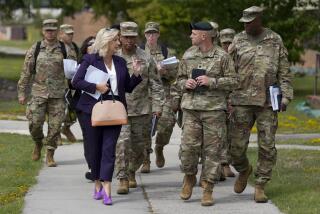Marines Learn to Hit Civilian Life Running : Military: Reverse boot camp designed to ease the transition from life in the service as Pentagon reduces ranks.
- Share via
They’re learning to say 5 o’clock instead of 1700 hours, to shake hands instead of saluting and to leave their shoes a little less than blindingly polished.
Call it reverse boot camp.
For the record:
12:00 a.m. April 10, 1992 For the Record
Los Angeles Times Friday April 10, 1992 San Diego County Edition Metro Part B Page 2 Column 4 Metro Desk 1 inches; 36 words Type of Material: Correction
Contractor’s identity--Dan Klause, a contractor with the U.S. Labor Department’s Transition Assistance Program, was incorrectly identified in a Wednesday story about how Marines and sailors at Camp Pendleton are being trained to find civilian jobs.
About 125 Marines and sailors at Camp Pendleton got a strange kind of training Tuesday, and it was almost as scary as learning how to storm the beach under enemy fire.
They were told how to become civilians.
And many, like Sharolyn McCraney, a 28-year-old Navy dental technician, weren’t looking forward to trading the clear-cut rules of military life for the unpredictable outside world.
“In boot camp, you just do what they tell you to do,” said McCraney, who has been in uniform for 5 1/2 years. “But with this (returning to civilian life), you’re on your own.”
The number of service personnel in McCraney’s position has exploded as the military prepares to dramatically reduce its ranks because of post-Cold War budget cuts.
By 1995, the Pentagon plans to shave 500,000 people from the armed forces, said David Ritterpusch, acting assistant secretary for the Department of Labor. Eventually, the Marine Corps, the smallest of the services, is expected to shrink from 196,000 to as low as 159,000.
At Camp Pendleton, home to about 36,000 Marines and the largest amphibious training base in the world, the government is helping troops prepare for the day that many never thought would come--shedding their camouflaged utility uniforms and searching for a civilian job.
“One of the first things you have to learn is to demilitarize your vocabulary . . . and demilitarize your resume,” Dan Claus, a representative of the state’s Employment Development Department told the group of Marines and sailors Tuesday.
He lectured his military audience to drop the code that signifies their rank, but draws a blank stare in the outside world. “An E-9 means nothing to a civilian--it’s six (letters) from a K-9,” Claus said.
(An E-9 identifies the Marine Corps’ top enlisted ranks--sergeant major and master gunnery sergeant.)
Some other suggested “civilianese” for the job seeker: commanding officer translates into chief executive officer in the business world; Navy operations specialist becomes a manager who trains and counsels others.
Although some of the advice was elementary (“Put your name at the top of the resume.”) other suggestions--like not wearing highly polished military shoes to job interviews--met with appreciation from the group whose members who were asked to show up wearing civilian clothes.
This is all part of a repeated five-day program Claus and other employment and veterans affairs specialists give for personnel who are leaving the service.
The veterans also receive instruction in such areas as writing cover letters, job interview skills, stress management and applying for veterans’ benefits.
Master Gunnery Sgt. Evelio (Skip) Puebla, 42, said he picked up time-saving tips on the job market, useful information for a man who is retiring after spending his entire adult life as a Marine.
He expects to “mess up” his first few resumes and interviews, but believes with determination he’ll find a job. “You have to be persistent . . . just don’t give up,” he said.
First Sgt. Van Brown, 43, who is leaving voluntarily “before I get any older and less competitive for the job market,” says the seminars have inspired confidence that he can handle the outside world.
He believes a job is a job and the only difference between military and civilian life is attire. In a regular job “you just wear different clothes every day,” he said.
Others are clearly unsettled by the peculiar process of unlearning years of military training.
“It’s fear of the unknown, especially if you have a family,” said Lance Cpl. Travis Brooks, 24, who returned last year from a 10-month stint in Operation Desert Shield/Storm to find that cutbacks meant he’d have no future in the military.
“I’m packing up shop and going back to Virginia,” he said.
More to Read
Sign up for Essential California
The most important California stories and recommendations in your inbox every morning.
You may occasionally receive promotional content from the Los Angeles Times.













